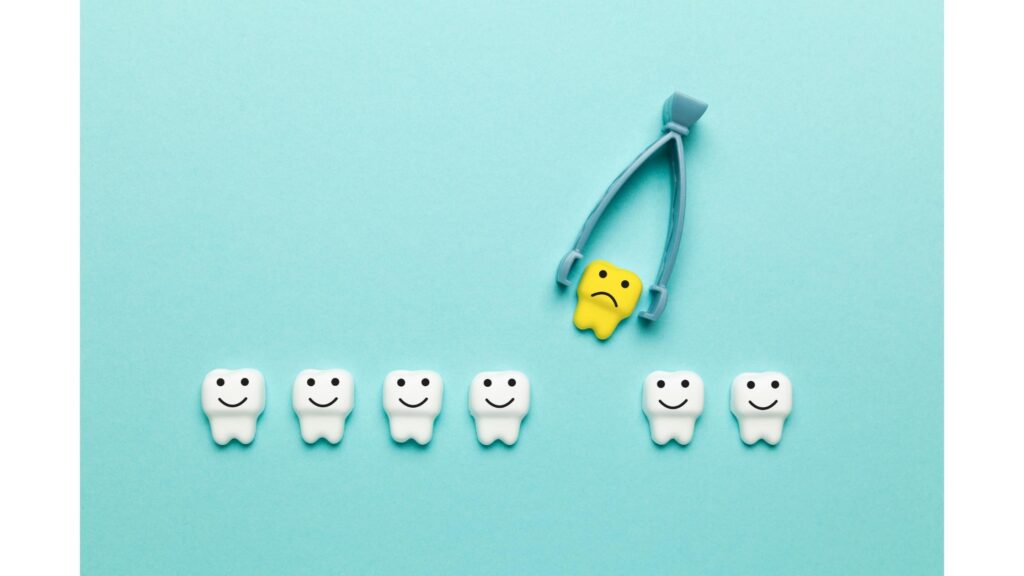I am very sorry that you are having pain next to the extraction site.
And you have started to wonder why is this happening?
why does the tooth next to the extraction hurt?
It is very common among people who have recently extracted their teeth and are suffering from pain. The bone and tooth socket are exposed as a result which causes bleeding and pain.
Blood clotting, pain, dry socket, and swelling are very common problems that can be eased by consuming the prescribed medicines and there is nothing to worry about.
Why are Teeth Extracted?
Teeth are extracted due to the following reasons-
1. Decay of tooth (Severe condition)
2. Severe gum infection
3. Severe fracture in the enamel
5. Injury of the tissue, ligaments, and bones of the mouth
7. Dental injury
Generally, the experts try to treat the infected teeth without extracting them. But sometimes it becomes obvious due to the above situations.
Why does the tooth next to my extraction hurt?

The tooth next to your extraction will hurt a lot depending on the location and the infected tooth’s severity of pain.
The teeth around your extraction hurt because of many reasons. Some of them could be-
- The pressure applied to your tooth during extraction also delivers the force on the adjacent teeth and bone. This transmitted pressure may cause pain in the bone to the surrounding teeth.
- Tissues adjacent to the infected teeth are damaged when outside pressure is applied. These damaged tissues may swell and cause pain in the tooth.
- Referred pain also appears here as the brain passes the pain massage through the nerve along the surrounding teeth. In that case, the adjacent teeth are also affected by pain.
- A dry socket is the most common reason for hurting next to the extraction point.
- The blank space created by the extracted teeth causes blood clotting and the clotting dissolves before healing the wound. This is called pain due to a dry socket. The bones and nerves are exposed at that place which causes pain and may cause infection also.
- Sinus perforation is another cause of pain. A perforation is a hole between the extraction point and your sinus. There is a blood clot formed to close that hole.
- Osteonecrosis may cause pain in the affected area as it is aseptic necrosis that is caused by the death of bone cells due to a lack of blood flowing.
- Sometimes roots aren’t properly extracted due to the lack of experience of the dentist. This remaining root also causes a lot of pain.
The teeth next to the extraction site hurt and it is very normal. Most people face this problem after removing their teeth. The above reasons are responsible for this temporary discomfort.
Why does it hurt next to the Extraction site when Chewing?
It does hurt next to the extraction site as it is swelled in pain.
When you chew, the bones and tissues of your mouth will move together at the same time. It will cause more blood to flow around the extracted area.
Damaged tissues, sore teeth, affected bones, adjacent teeth, and all the other parts of your mouth will also assist in this chewing process. This will not let the healing process take place. Clotting of blood will not take place, as a result, the place will hurt more. Infection, pain, swelling, and bleeding may occur.
Relaxation of the muscle, tissue, and bones is essential to recover fast.
How Long Does a Tooth Next to an Extraction Hurt?
Generally, the pain remains for around 2-5 days on the extraction site if everything is alright. If the pain remains more than the normal time, it is suggested to appoint the dentist as soon as possible.
Drilling in the bone, dry socket, and dissolving clotted blood can prolong the pain and swelling. Painkillers and other prescribed medicines must be consumed to return to the normal state of oral health.
Side effects of Teeth Extraction
The side effects are-
1. Swelling
2. Bleeding
3. Pain
4. Dry socket
5. Infection
6. Perforation of sinus
Aftercare
1. Following the prescription of the dentist
2. Cleansing mouth properly
3. Using mouthwash or other dental products to maintain oral health rather than brushing
4. Consuming liquid and soft food for the mouth
5. Avoiding movement of the jaw as much as possible
If these are followed properly, it is hoped that you will not face any severe problems unless there is any fault from the dentist while extracting your tooth.
Final Thought
Tooth extraction may be needed when you have a severely damaged tooth. It is very normal and there is nothing to be feared about.
Expert dentists perform these operations with intensive care and can relieve you from the unbearable pain of that infected tooth.
An extracted site is opened to the bone and nerve which may be dangerous if not treated properly. If the treatment is taken seriously, problems can be avoided, and healthy oral health can be maintained.
